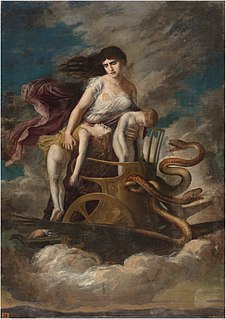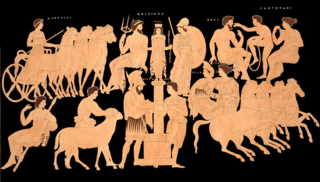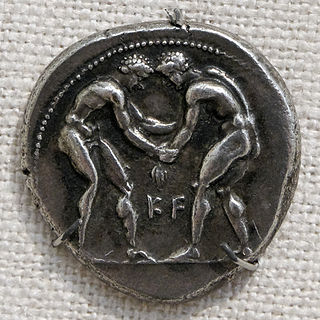Related Research Articles

Jason was an ancient Greek mythological hero and leader of the Argonauts, whose quest for the Golden Fleece featured in Greek literature. He was the son of Aeson, the rightful king of Iolcos. He was married to the sorceress Medea. He was also the great-grandson of the messenger god Hermes, through his mother's side.

In Greek mythology, Medea is the daughter of King Aeëtes of Colchis, a niece of Circe and the granddaughter of the sun god Helios. Medea figures in the myth of Jason and the Argonauts, appearing in Hesiod's Theogony around 700 BC, but best known from Euripides's tragedy Medea and Apollonius of Rhodes' epic Argonautica. Medea is known in most stories as a sorceress and is often depicted as a priestess of the goddess Hecate.
In Greek mythology, Danaus was the king of Libya. His myth is a foundation legend of Argos, one of the foremost Mycenaean cities of the Peloponnesus. In Homer's Iliad, "Danaans" and "Argives" commonly designate the Greek forces opposed to the Trojans.
In Greek mythology, Adrastus or Adrestus, , was a king of Argos, and leader of the Seven against Thebes. He was the son of the Argive king Talaus, but was forced out of Argos by his dynastic rival Amphiaraus. He fled to Sicyon, where he became king. Later he reconciled with Amphiaraus and returned to Argos as its king.

Diomedes or Diomede is a hero in Greek mythology, known for his participation in the Trojan War.

In Greek mythology, King Oenomaus of Pisa, was the father of Hippodamia and the son of Ares. His name Oinomaos signifies him as a wine man.

The Nemean Games were one of the four Panhellenic Games of Ancient Greece, and were held at Nemea every two years.

Chariot racing was one of the most popular ancient Greek, Roman, and Byzantine sports. Chariot racing was dangerous to both drivers and horses as they often suffered serious injury and even death. These dangers added to the excitement and interest for spectators. Chariot races could also be watched by women, who were banned from watching many other sports. In the ancient Olympic Games, as well as the other Panhellenic Games, the sport was one of the most important equestrian events. Each chariot held a single driver and was usually pulled by four horses.

Greek wrestling, also known as Ancient Greek wrestling and Palé, was the most popular organized sport in Ancient Greece. A point was scored when one player touched the ground with his back, hip or shoulder, or conceding defeat due to a submission-hold or was forced out of the wrestling-area. Three points had to be scored to win the match.

The ancient Olympic Games were a series of athletic competitions among representatives of city-states and one of the Panhellenic Games of Ancient Greece. They were held in honor of Zeus, and the Greeks gave them a mythological origin. The first Olympic Games are traditionally dated to 776 BC. The games were held every four years, or Olympiad, which became a unit of time in historical chronologies. They continued to be celebrated when Greece came under Roman rule, 2nd century BC. Their last recorded celebration was in AD 393, under the emperor Theodosius I, but archeological evidence indicates that some games were still held after this date. The games likely came to an end under Theodosius II, possibly in connection with a fire that burned down the temple of the Olympian Zeus during his reign.

Der Ring des Polykrates, Op. 7, is a one-act opera by Erich Wolfgang Korngold. The libretto, written by Leo Feld and reworked (unattributed) by the composer's father Julius Korngold, is based on a drama by Heinrich Teweles.

Polycrates' Ring is a lyrical ballad written in June 1797 by Friedrich Schiller and first published in his 1798 Musen-Almanach annual. It is about how the greatest success gives reason to fear disaster. Schiller relied on the accounts of the fate of Polycrates, tyrant of Samos, in Herodotus' Histories, Book III.
In Greek mythology, Hyrnetho was a daughter of Temenus, and the wife of Deiphontes, by whom she became mother of Antimenes, Xanthippus, Argeius, and Orsobia.
Polycrates may refer to:
In Greek mythology, Amphilochus was an Argive hero and one of the Epigoni.
Zeuxo of Cyrene daughter of Ariston of Cyrene won the harma polikon at the Panathenaia of 198BC Zeuxo's husband Polykrates of Argos, son of Mnesiades, was victorious at the same Panathenaia, their daughters, Eukrateia, Hermione and -Zeuxo, were also victorious at Panathenaia of 170-169 BC.
Zeuxo daughter of Polykrates of Argos won the harma polikon in the Panatenaia of 202 BC. Her sisters: Eukrateia and Hermione were also victorious at the same Panathenaia her father Polykrates and mother, also named Zeuxo, were victorious at the Panathenaia as well. Zeuxo was also victorious at the panathenaia in 182 BC.
Hermione, daughter of Polykrates of Argos, won with keles teleion in the Panathenaia of 202 BC. In the same year her sisters also won: Eucrateia with harma teleion and Zeuxo with harma polikon.
References
- ↑ "Eukrateia daughter of Polykrates from Argos (Argeia)". Connected contests: Ancient athletes online.